There are plenty of tools available in the market claiming to provide everything a small business needs.
But the truth is that no tool or software can provide you with everything you need to run a business smoothly. Instead, you need to pick the best set of tools (within your budget) for different functions and assemble them.
With thousands of tools to pick from, it can be overwhelming and time-consuming for you to try tools and find the most relevant tool for your day-to-day business operations.
That’s why I have prepared this ultimate toolkit for small businesses in which you’ll find the best tools you will need to manage your day-to-day business operations.
Ready? Let’s get started.
Marketing Tools for Small Businesses
Marketing is vital for business growth and there are thousands of tools that you can use to automate your marketing process across multiple channels.
Here are the essential marketing tools you need to manage and grow your business –
1. ActiveCampaign
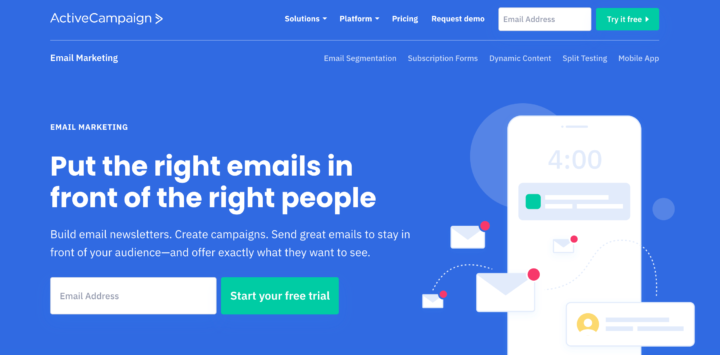
ActiveCampaign is the best email marketing software that offers advanced automation and targeting features. You can deliver personalized marketing communication to your prospects and customers throughout the customer journey and generate more sales.
It is an ideal email marketing tool for small businesses because designing the automation workflow and email editor is handy with its robust drag-and-drop editor.
Read – Best Email Marketing software for small businesses
2. ConvertKit
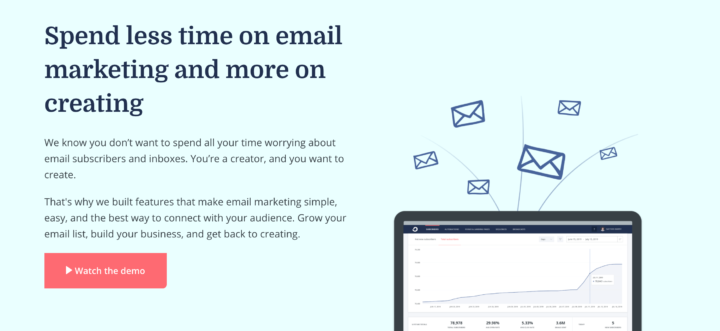
If you are looking for an email marketing tool with basic automation and personalization features, ConvertKit is the best alternative to ActiveCampaign.
It is comparatively inexpensive and comes with a fully customizable email template, landing pages, and embeddable forms that let you convert your website, visitors, into subscribers, leads, and customers.
3. PushEngage
PushEngage is the #1 web notification software that allows you to send browser notifications to subscribers. If your website goal is lead generation and engagement, you can use PushEngage to send blog updates and news to subscribers to get them back to your site.
Similarly, if you’re into eCommerce, PushEngage can be your tool to send product updates, cart abandonment reminders, and offer and discount updates. It also lets you create segments based on location, behavior, and other factors that you can use to send unique and personalized offers to your customers to boost sales.
4. OptinMonster
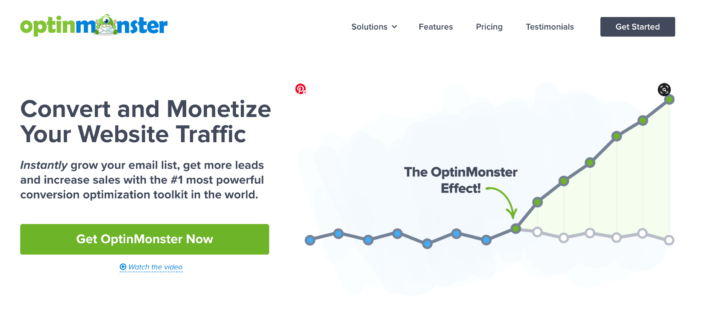
OptinMonster is a robust popup form builder and a website conversion optimization tool. It lets you create and deliver personalized pop-ups to your website visitors based on various targeting options like location, time, and past behavior on the site.
It is the best tool to convert your website, visitors, into email subscribers, leads, and sales by automating and personalizing your site’s customer experience.
5. Semrush
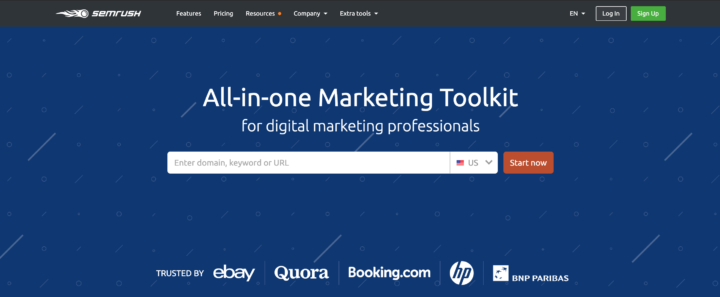
Semrush is my favorite SEO tool, and if one of your marketing objectives is to generate high-quality organic traffic to your site, I highly recommend you try this tool.
It offers a complete SEO solution that includes –
- Keyword research
- Rank tracking
- Link building
- Site Audit
- Competitor Analysis
- PPC research and more
It also lets you schedule and manage your social media posts across multiple platforms, which is great, but I have another tool for that purpose in the toolkit.
6. Buffer
Buffer is the simplest social media management tool that you can use to schedule posts on different platforms and boost the engagement rate. What makes it different from other social media management tools is its engagement features that let you add stories, add the first comment below the post, organize your hashtags, and more.
It is easy to use and affordable for small businesses. It also offers a free plan to add three social profiles and schedule up to 10 posts.
7. Agorapulse
If you are looking for a social media management tool that offers more than just scheduling the posts, Agorapulse is the best tool for you.
It offers you advanced features like social listening, automated social inbox response, follower tracking, and more, along with bulk post scheduling. Agorapulse is comparatively expensive, but it is worth your investment if you want to level up your social media marketing.
8. Canva
Canva is the #1 graphic designing platform that enables you to collaborate with your team and create beautiful graphics for social media and other marketing activities.
It offers 6000+ stunning templates for different graphics types from social media posts, stories, and ads to banners and posters.
You can also design beautiful infographics, presentations, and banners within minutes using its drag-and-drop editor. Recently, they also added features to create video posts and ads, which is superb and you must try.
Sales Tools for Small Businesses
Marketing alone may not be enough for businesses to generate sales. You need sales tools to empower your sales team to send meeting reminder messages and follow-up emails to keep prospects and leads engaged.
Here are a few of the best sales tools your sales team needs to work efficiently and generate more sales.
1. Close
If you are not using any specific CRM software for your business, you will at least need a CRM for your sales team where they can track and manage their sales pipeline.
Close is the best sales CRM that comes with in-built call, email, and SMS services. You can set up automated calls send SMS reminders about meetings and respond to messages right from the Close dashboard.
Above all, it makes it easy for you to set up an automated follow-up email sequence with its personalized email templates. Sounds interesting? Start a 14-day free trial.
2. Nextiva
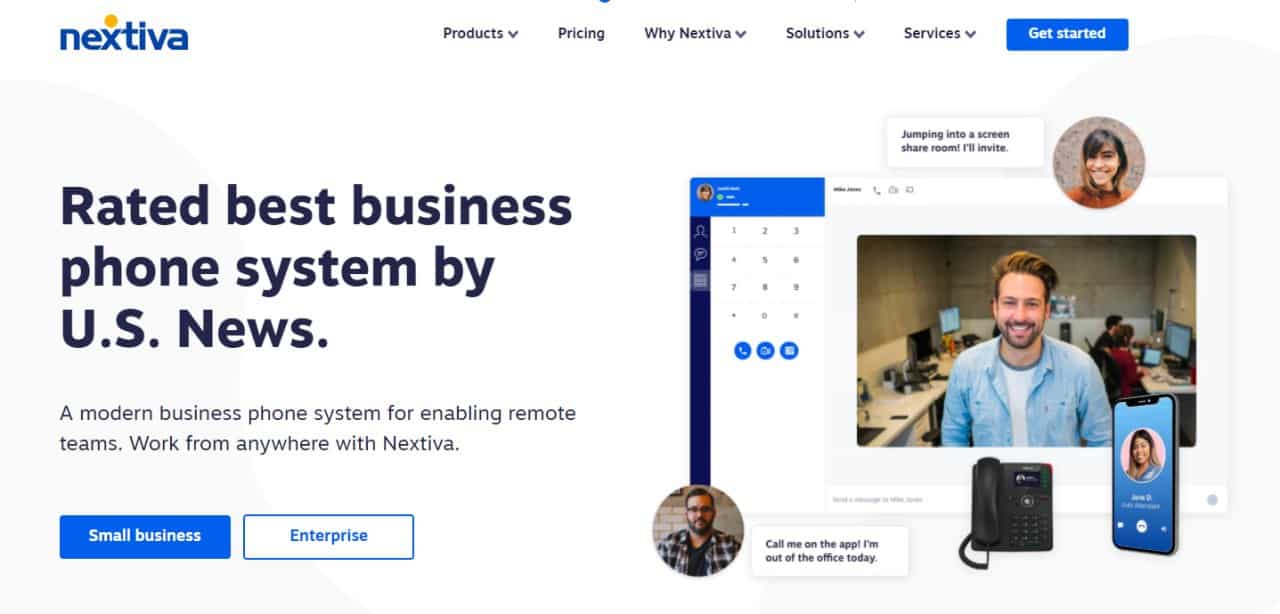
Nextiva is the #1 VoIP service provider that enables you to make and get business calls directly from your PC or smartphone. It gives your sales personnel accessibility to stay connected with your clients and prospects anytime, even if they work from home.
3. LeadPages

Leadpages is one of the best landing page builders for small businesses. It is an affordable yet powerful landing page builder that offers 100+ customizable and responsive templates.
Its robust drag-and-drop page editor is easy to use and enables you to design high-converting landing pages for your products and services within minutes.
4. Livestorm
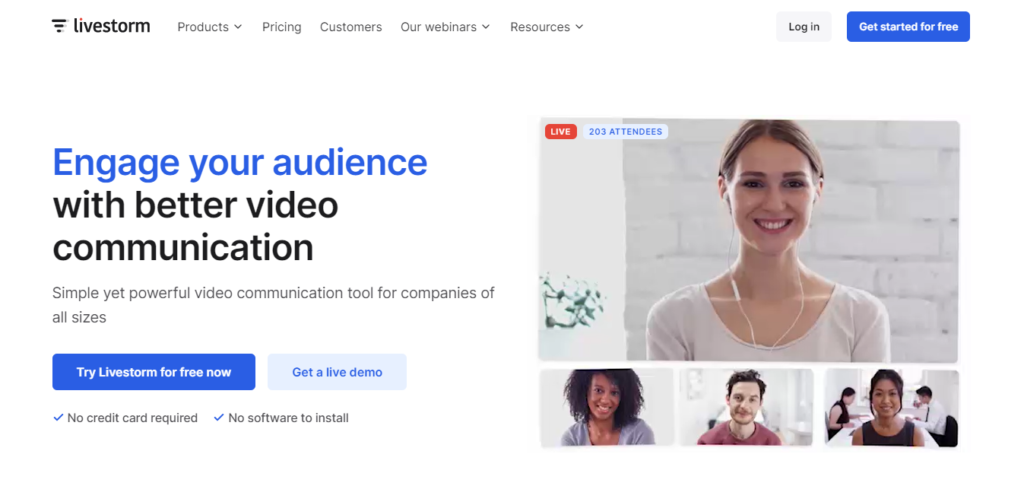
Livestorm is the best webinar hosting platform for small businesses. It is a perfect tool for your sales and marketing tool to educate consumers about your product via webinars to generate leads and engage them throughout the customer journey.
One of the best things about Livestorm is its on-demand webinar hosting, which your sales team can use to give product demos 24/7 worldwide. Isn’t this the best tool to make your team productive? If you’re into the B2B space, you should read the complete guide on how to use webinars for B2B marketing.
5. Hunter.io
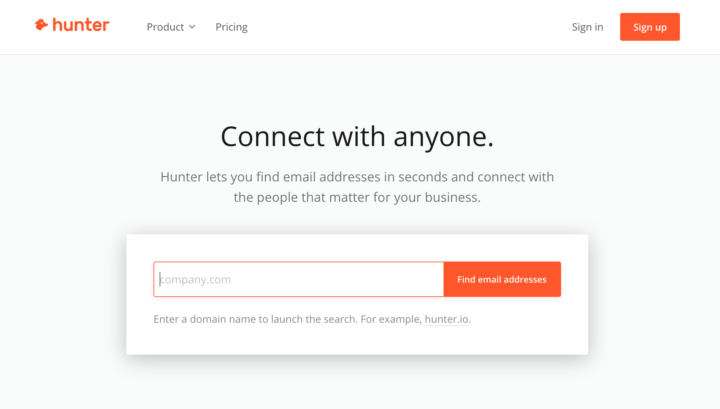
It is an email-hunting tool that lets you find your prospects’ email addresses just by entering the website address of the target company.
It also provides an email verifier tool that checks if the selected email addresses are still valid and whether the message will be delivered to the right inbox or not. And you’ll be charged only for the correct email addresses.
6. LinkedIn Sales Navigator
If you are into the B2B space, LinkedIn Sales Navigator is the must-have lead prospecting tool for you.
It enables your sales team to find more potential leads by tapping into the world’s #1 professional networking platform. This tool matches your ideal customer profile and customer persona with LinkedIn profiles and recommends the most potential leads for your business.
It integrates with most of the CRM software available in the market, making it easy for you to import the prospects’ contact details into your database and track their behavior across multiple channels.
Analytics Tools for Small Businesses
Today. If you are not using analytics data to make well-informed data-backed decisions for your business, you are probably losing many growth opportunities on the table.
Analytics data provide you insights into how your customers interact with your sites and what can be done better to improve their experience and generate more sales.
1. Google Analytics (Free)
If you have a website for your business (which you should have), Google Analytics is the best tool to analyze your website performance. Google Analytics is a free and robust website analytics tool that provides you with insights about your website traffic – sources, technology, location, etc., and about your visitors – behavior analytics, time spent, top pages, etc.
And you can use all the data and insights gathered from this tool to optimize your website content strategy to improve the engagement and conversion rate.
2. Hotjar
Hotjar is the best heatmap analytics tool that shows how visitors are engaging on your site. It is a must-have conversion optimization tool for websites.
You can use this tool to optimize your website design for better conversion and engagement rate by determining the design faults in terms of customer experience and responsiveness.
CRM Software for Small Businesses
Managing customer data on Google Sheets is outdated, and it’s not efficient enough to keep it up to date. That’s why you need robust CRM software for your business where you can manage your customer and prospects’ data, track their activities and automate the process to keep them engaged throughout the journey.
Here are a few of the best CRM software you should know about.
1. HubSpot
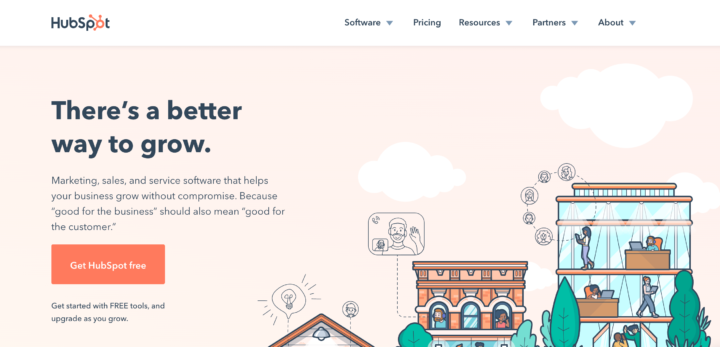
HubSpot is the most recommended CRM software for small businesses because of its affordability and the features it offers. It’s an all-in-one platform for marketing, sales, and service teams.
HubSpot’s free plan is even better than most of the CRM software available in the market. With its free plan, you get a free deal management tool, live chat, email marketing, social media advertising, inbox management, and a lot more for sales and marketing teams.
2. Pipedrive
Pipedrive is one of the leading sales management tools that seamlessly helps manage all your leads pipeline, proactively communicate with them, and automate repetitive tasks.
It is very easy to use as you can find all the contact details and past activities related to deals right on your dashboard. It offers seamless integration with major sales and marketing tools like chatbots and email services, making it easy to track and import all the data.
Above all, it provides a mobile app that lets you upload images, files and keep notes related to deals and access them from anywhere on any device.
3. Bitrix24
Bitrix24 is an all-in-all free collaboration platform that offers a wide range of tools to manage and grow your business. It streamlines the entire communication process, manages all the daily tasks, builds your sales pipeline by offering a scalable CRM, and lets you create stunning website/landing pages on the fly.
It also provides a help desk where you can instantly respond to all the queries of your we. This tool comes in handy with Android and iOS apps, giving you instant accessibility and convenience to update data, design pages, and view analytics.
Customer Assistance Tools for Small Businesses
Whether you run a product or service-based business, you need customer assistance tools to help them with their problems or queries related to your services.
1. Tidio Chat
Tidio is the best live chat and chatbot app for websites. You can use it as a customer support tool to assist your customer queries by sending quick responses. It also shows you a real-time view of users visiting your site, allowing you to send them a message first to understand their needs.
Its chatbot features allow you to engage with your website visitors even after working hour and collect their contact details to reach them regarding their queries.
Tidio is an excellent live chat app for businesses of all kinds. You can check my guide on the best live chat tools to find the right live chat software for your business.
2. Helpjuice
Helpjuice is a robust knowledge base software that can create a robust knowledge base, storing both structured and unstructured information related to your products.
It is an excellent tool for SaaS-based product companies in which customers may need guidance with technical challenges. A knowledge base can be a go-to page for them to find answers and resolve them without waiting for assistance from your team.
Helpjuice provides a Google-like search engine where users can enter their queries, and all relevant results will be displayed. Above all, it is SEO optimized and supports multiple languages, which lets you create a knowledge base in different languages for your global customers.
Accounting Tools for Small Businesses
Accounting and finance can be the most complicated and time-consuming tasks in your business. And if not done correctly, it can put you into legal and financial trouble.
That’s why you must use financial tools to help you manage your expenses, investments, payroll, the billing process, etc.
1. QuickBooks
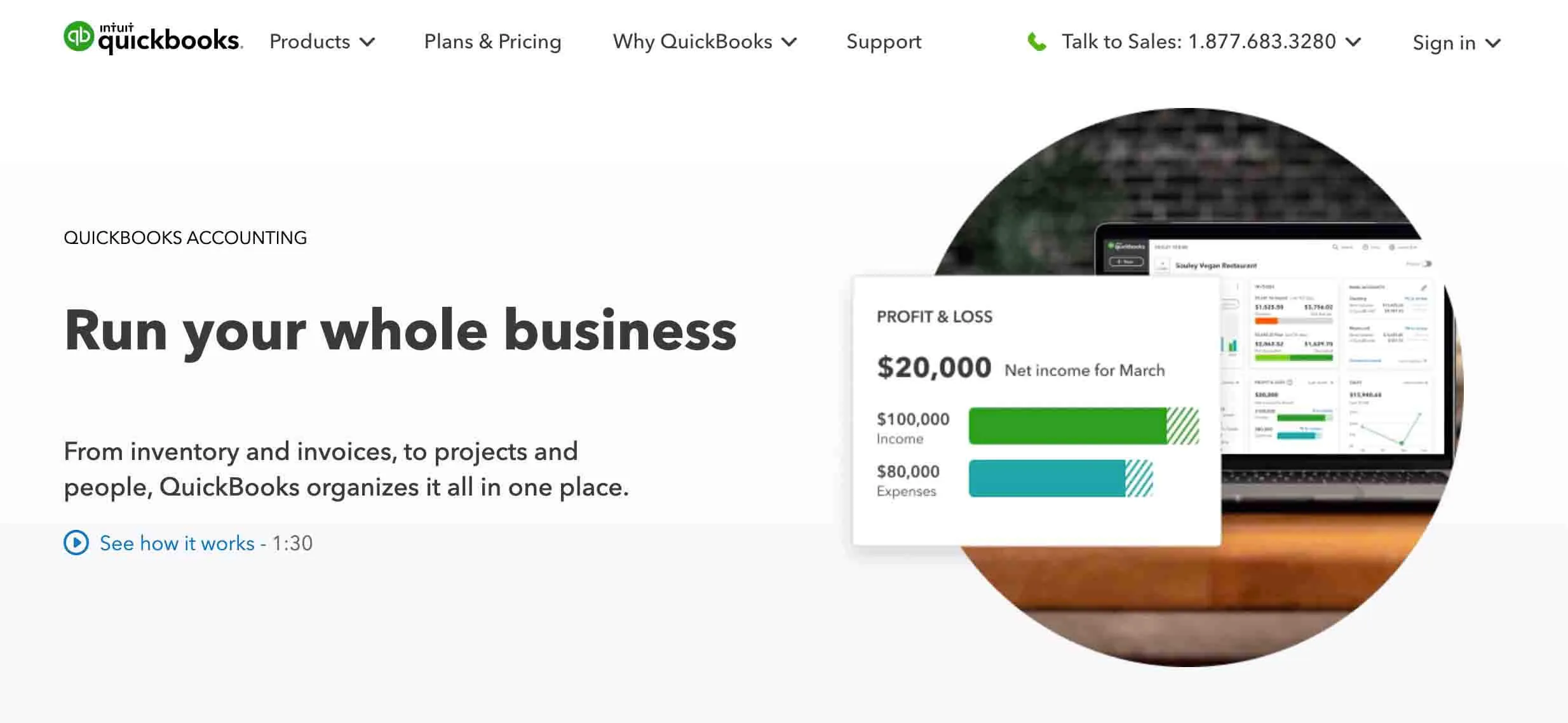
Quickbooks lets you manage all the financial operations by tracking sales, and expenses, generates invoices, and also gives detailed reporting thereby you can critically analyze the financial stability that is important for your business to survive in the growing market.
You can also connect your official bank account to QuickBooks so that all the transactions and statements will get updated automatically without any hassle.
It also provides a mobile app available for immediate accessibility, and the best part is that all your data is hosted on the cloud system.
2. Taxjar

Taxjar is a sales tax and reporting software that automates the process of tax filing. It complies with the taxation regulations in your place of business and ensures that you collect the right taxes on your products.
This tool automates every step from charging the right sales tax to filing taxes in due time without your interference in between. It saves you a lot of time and keeps you away from tedious and manual processes so that you can focus on other important aspects of the business.
3. FreshBooks
FreshBooks is one of the most recommended online financial management tools that help you manage invoices and accounting operations productively.
You can explicitly track and organize all the expenses you’ve made so that there is proof for each valuable buck that has been spent.
It also provides various accounting reports like balance sheets, general ledger, profit & loss, etc., to give a crystal-clear focus on all your financial operations that are being carried on.
Your teammates can collaborate by having all the files, conversions, etc., in a centralized system. They can also invite your business contractors, employees, or partners to access the files they have permitted.
Legal Assistance Tools for Small Businesses
Legal assistance tools keep you away from legal troubles by keeping you well-informed and preserving important documents like contract papers, agreements, etc.
Here are a few tools that you must know about and use whenever you seek legal assistance.
1. Trademarkia
Trademarkia is typically a trademark search engine where company owners can type a search phrase and see how many businesses have registered for that particular word so that you cannot use those words to register for your business.
You can also register your trademark on this platform by strictly adhering to its rules. It also lets you search logos for free and shows the list of filed/inactive logos so that you will know which logo is officially registered or not.
2. DocuSign
DocuSign is an electronic signature and agreement platform that allows organizations to send, sign, and efficiently manage all legally binding documents highly secure in the cloud system.
You can also view the status of your e-document in its signing process by setting up automatic reminders so that you’ll be notified. It works well on mobile devices like Android and iOS devices, making the process simplified by allowing you to sign documents from anywhere.
HR Management Tools for Small Businesses
Managing the team personnel can be tiring for small businesses because you usually don’t have many HR professionals to drive talent acquisition and other management-related activities.
Here are a few tools that your HR team can use to efficiently hire, onboard, off-board, and manage leave queries.
1. Workable
Workable is one of the best talent acquisition software where companies can screen various applications, evaluate them, and select the best candidates.
It lets you post job openings on multiple sites, and you can automate all the important steps involved in the hiring process like getting approvals, interview scheduling, etc, which saves your time and keeps you on track.
2. LinkedIn Recruiter
If your business has its official page on Linkedin, then attracting the right set of talents becomes much easier with the help of the LinkedIn Recruiter tool.
LinkedIn Recruiter is a dedicated platform for hiring professionals to find the right talent pool for their business. It offers advanced search filters to look for the perfect set of candidates and recommends the best profiles suited for the job roles.
3. Freshteam
FreshTeam is a robust HR software designed for emerging businesses that effectively manages all the processes like hiring, onboarding, offboarding, and time-off policies and offers an intuitive mobile app to be active no matter where you are.
It readily synchronizes your career email inbox with the applicant tracking system. It enables you to create custom workflows for job openings so that you can witness how different sets of candidates travel across multiple stages.
Wrapping Up
Finally, I recommend you to work hard but be smart and make tools work for you, and allow yourself to focus on major business issues.
I hope this article will help you pick the best tools for your business and if you find something missing, do let us know via comments below.
